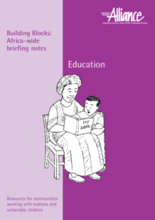It is vital for children’s futures that they attend school and take full advantage of their education. Education is also important for their psychosocial development. Schools can provide children with a safe, structured environment, the emotional support and supervision of adults, and the opportunity to learn how to interact with other children and develop social networks. Education can also reduce children’s risk of HIV infection by increasing their knowledge, awareness, skills and opportunities.
However, children affected by HIV are less likely than other children to be enrolled in school or attend regularly. They may not perform as well as they could, nor remain in school long enough to attain basic literacy or qualifications. They may become even more vulnerable as a consequence.
This document is one section of a six-part guide to help communities and local organizations in Africa support children orphaned and made vulnerable by HIV and AIDS. This section outlines the impact of HIV/AIDS on children’s education, describes principles and guidelines for programmes aimed at meeting children’s educational needs, and suggests strategies for taking action to meet the educational needs of orphans and vulnerable children. The conclusion of this document includes a list of useful resources for follow-up.
©International HIV/AIDS Alliance

